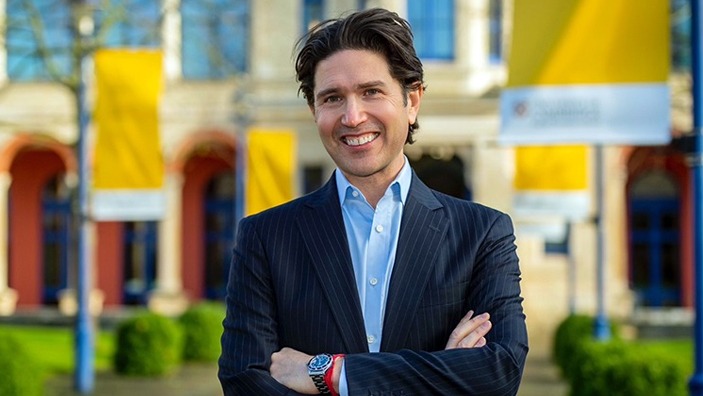There are many well-known phrases that look at speech, action and results. The early bird, of course, gets the worm, while closed mouths don’t get fed. Just as the squeaky wheel gets the grease, we’re told that fortune favours the bold. Then there are individuals and firms that, it is said dismissively, talk the talk but don’t walk the walk.
Yet in times of turmoil and uncertainty it is often better to walk without speaking, says Christopher Marquis, Sinyi Professor of Chinese Business at Cambridge Judge Business School, and this can take the form of what he terms strategic hibernation.
“Strategic hibernation means to take a well-thought-through break from certain activities – at least publicly – and this often means lower external visibility,” says Chris. “If out of sight means out of mind, that isn’t necessarily a bad thing in certain political climates such as we’re seeing around the world right now. Laying low can be a particularly good tactic following a change in government policy, and such a strategy can in the long run be both wise and productive. Hibernation by its nature is a pause rather than a cessation or permanent retreat.”
“Strategic hibernation means to take a well-thought-through break from certain activities – at least publicly – and this often means lower external visibility. If out of sight means out of mind, that isn’t necessarily a bad thing in certain political climates such as we’re seeing around the world right now.
The implications of how Mao still influences China business
Take China, the subject of Chris’s 2022 book Mao and Markets, which outlined how business in modern China and the country’s spectacular economic growth over the past 4 decades still strongly reflect the Communist ideology of Mao Zedong, the founder of the People’s Republic of China.
While China encouraged freewheeling enterprise in technology for several decades, and produced global players such as infrastructure-to-device maker Huawei, there has been a crackdown on tech since 2020 in line with the patriotic themes espoused by President Xi Jinping. As outlined in Mao and Markets, the national champions policy under President Xi makes clear that “enterprise marketing knows no borders, but entrepreneurs have their motherland” – which translates into a strong sense of responsibility for the Chinese nation and its people.
“Excellent entrepreneurs must have a high sense of mission and a strong sense of responsibility for the country and the nation, and closely combine the development of their enterprises with the prosperity of the country, the prosperity of the nation and the happiness of the people and take the initiative to bear the responsibility and share the worries for the country,” said President Xi.
Chinese tech giants show the value of laying low in certain times
Chris says the recent contrasting fortunes of online retailing platform Alibaba and tech conglomerate Tencent underline the value of strategic hibernation in such circumstances. After Alibaba co-founder Jack Ma, in a Shanghai speech in October 2020, criticised Chinese regulators for stifling innovation through an over-adherence to risk prevention, he largely faded from public view for several years. Then, following reports that his Ant Financial firm was planning to revive a long-stalled initial public offering, such an IPO remained suspended amid slumping profits for Ant Group.
In contrast, Tencent, the firm behind messaging powerhouse WeChat and a leader in online payments, has kept its head down in terms of political statements or criticism of any sort, and in 2021 donated $7.7 billion to China’s common prosperity in the form of reducing inequality and poverty through better access to medical care and education. In addition, WeChat grew involved in e-government initiatives such as lightweight apps that Chinese agencies use to deliver services such as educational records, certifications and platforms that different governments can share in order to boost efficiency.

“While the valuation of both firms fell after the state tech crackdowns, Tencent has been far more resilient,” says Chris, noting that Tencent’s stock has averaged 15% annual returns over the past 3 years compared to a decline of more than 3% for Alibaba, whose market value now stands around $400 billion compared to a 2020 peak of around $600 billion.
Chris’s broader thinking in this area, as reflected in a recent Harvard Business Review article he wrote, also draws on an example from the academic literature that shows the value of these strategies after an eventual policy reversal. A 2015 study in the journal Organization Science on India’s private banks during a period of high government control in the 1980s and 1990s showed that the banks that followed a dormancy strategy – staying close to government policy and preserving hard-to-rebuild capabilities – were well positioned to succeed after the Indian banking market subsequently opened up.
Strategic hibernation: a subtle alternative to traditional tactics
While Chris’s time living in China and researching Chinese business influenced his interest in the idea of strategic hibernation, his attention to this topic revived when he saw “how American companies reacted when things changed really dramatically” as Donald Trump began his second term as US President.
Traditionally, corporate response to political changes has been thought of in terms of German economist Albert Hirschman’s classic 1970 trichotomy of exit, voice or loyalty. For example, in 2018, Uber exited a number Southeast Asian markets amid a tough mix of local rules and fierce competition. Tesla exercised voice with US state lawmakers about franchise-dealer protections so it could keep selling cars directly to customers. Apple placed mainland Chinese users’ iCloud data on domestically hosted servers run by a government-linked provider to meet cybersecurity requirements. These different moves show companies navigating fraught political and regulatory terrain by relying on Hirschman’s time-honoured response toolkit.
What Chris observed in China under Xi and America under Trump’s second term suggested there may be another option: “We saw how many companies that had been quite vocal previously on topics like diversity and climate issues had clearly backed away from those commitments – for example, cancelling certain DEI (diversity, equity and inclusion) policies and abolishing DEI offices – but we also saw how other companies seemed to be a lot more measured in their reactions: you clearly don’t want to be in the crosshairs of the Trump administration, but you want to continue doing work that you think is important in areas such as ESG (environmental, social and governance) initiatives.”
Chris says that what is salient here is the divergence of political ideology and business reality. “Science shows that there are significant future climate risks (and opportunities), and many business reasons for a diverse workforce, and so while the Trump administration may be attacking these areas, business leaders know that abandoning them will negatively affect their business.”
Science shows that there are significant future climate risks (and opportunities), and many business reasons for a diverse workforce, and so while the Trump administration may be attacking these areas, business leaders know that abandoning them will negatively affect their business.
This quiet but sure approach on ESG issues of many US firms during the second Trump term illustrates how strategic hibernation in the business world is very different from the way animals may hibernate. While a bear survives months of hibernation without eating or drinking, surviving on stored fat while its metabolism and heart rate drops sharply, companies cannot afford such a deep sleep in a competitive market. So in contrast to the bear’s full slumber, hibernating firms that don’t want to advertise certain activities often continue these activities far below the radar the way a duck’s seemingly effortless gliding on a lake’s surface masks spirited yet unnoticed webbed footwork underwater.
“Big companies in the US are now issuing far fewer press releases and other statements touting their ESG credentials, but these activities continue to percolate and this is important for internal company values and coherence,” says Chris. “Decarbonisation efforts are a clear case in point.”
While some have derisively labelled this ‘greenhushing’ – when companies avoid sustainability messaging just to avoid scrutiny – Chris emphasises that what makes strategic hibernation different is the focus on ensuring that internal commitments continue and also the importance of vigilantly staying abreast of the political situation.
Big software firms quietly help their clients with decarbonisation efforts
For example, Chris cites how Microsoft has created an emissions impact dashboard that allows other firms to estimate their carbon emissions and emissions already saved through the cloud services Microsoft Azure and Microsoft 365, while customer relations management (CRM) platform Salesforce has issued a guide for firms to use artificial intelligence agents for sustainability.
“Trump may say to the United Nations about how climate change is a scam, but these big successful companies know that climate change is based on science,” says Chris. “So to just give that up completely would be a serious business mistake, but waving the flag to draw lots of attention in this political climate would also not be a good business decision.
“So we are seeing companies strike a balanced perspective of doing things behind the scenes. This is unusual: usually when you think about marketing and advertising, companies want people to know about their activities. So doing these kinds of things under the radar is diametrically opposed to what many firms are used to doing, but they have made a strategic decision that quiet continuation rather than loud announcements is the way to go for now.”
Doing these kinds of things under the radar is diametrically opposed to what many firms are used to doing, but they have made a strategic decision that quiet continuation rather than loud announcements is the way to go for now.
Featured research
Marquis, C. and Qiao, K. (2022) Mao and markets: the Communist roots of Chinese enterprise. New Haven and London: Yale University Press.
Marquis, C. (2025) “Is this a moment for strategic hibernation? A new model for business resilience in a potentially turbulent era.” Harvard Business Review, Nov/Dec
Kozhikode, R. K. (2015) “Dormancy as a strategic response to detrimental public policy” Organization Science.





